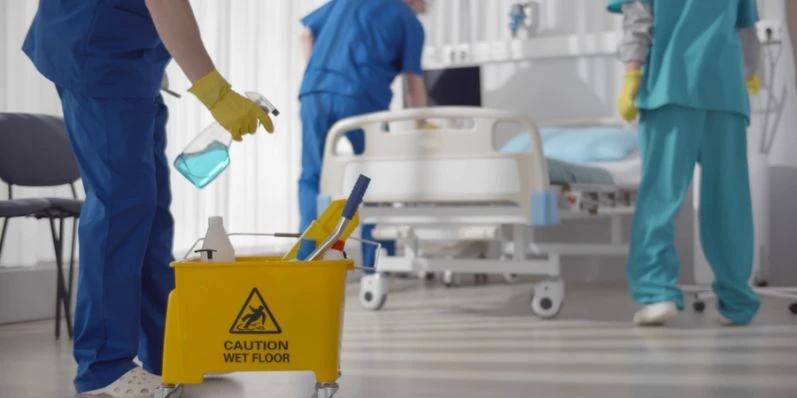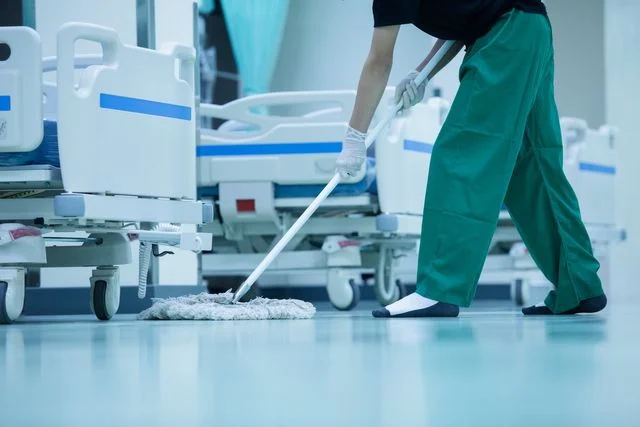In today’s fast-paced world, ensuring a safe and healthy environment within medical offices is paramount. Tackling infection control has become a crucial aspect of healthcare, and medical office cleaning plays a pivotal role in keeping patients safe. L&G Cleaning Services explores the importance of infection control, the role of professional cleaning services, key areas of focus, special considerations, training and education, regular maintenance, advancements in cleaning technology, and the benefits of hiring professional cleaning services in medical offices. So, let’s delve into the topic and understand how medical office cleaning in Colorado ensures the well-being of patients and staff.
When it comes to maintaining a safe and healthy environment, medical office cleaning plays a crucial role in infection control. In Colorado, medical facilities prioritize the well-being of their patients by implementing stringent cleaning protocols. This proactive approach ensures that harmful pathogens are effectively eradicated, minimizing the risk of infections. From waiting areas to examination rooms, every surface is meticulously sanitized using hospital-grade disinfectants. Furthermore, professional cleaners in Colorado undergo specialized training to adhere to industry standards and guidelines. By employing thorough and systematic cleaning practices, medical offices in Colorado create a safe haven for patients, promoting their overall health and well-being.
Importance of Infection Control in Medical Offices
Healthcare-associated infections are a serious concern in medical settings. Patients seeking care are already vulnerable, and contracting an additional infection can prolong their recovery or even lead to severe complications. By implementing stringent infection control measures, medical offices can significantly reduce the risk of HAIs and protect the well-being of patients.
Preventing the spread of infectious diseases is another crucial aspect of infection control. Medical offices often serve patients with various illnesses, and proper cleaning protocols can help contain the transmission of pathogens. This is particularly crucial in the wake of outbreaks or pandemics, as it helps limit the spread of diseases within the community.
Understanding Medical Office Cleaning
Professional cleaning services specializing in medical office cleaning play a vital role in maintaining a safe and hygienic environment. These services are equipped with the knowledge, expertise, and specialized tools necessary for effective cleaning and disinfection. They adhere to strict cleaning protocols and follow industry standards to ensure optimal cleanliness and infection control.
Cleaning professionals focus on various aspects of medical office cleaning, including thorough surface cleaning, disinfection of high-touch areas, proper waste disposal, and maintaining air quality. They understand the specific requirements of medical offices and tailor their cleaning practices accordingly.
Key Areas of Focus for Medical Office Cleaning
To ensure comprehensive infection control, medical office cleaning services prioritize specific areas within the facility. These areas include:
Reception and Waiting Areas: Making a great first impression is essential, especially in reception and waiting areas. A clean and well-maintained space sets a positive tone for patients. Regular cleaning of surfaces, thorough disinfection of chairs and tables, and effective waste management play a pivotal role in ensuring a safe and inviting environment.There is a significant link between good cleaning and infection control beacause a clean environment is about more than just aesthetics; it is also about emphasizing the well-being of everyone who attend.
Examination Rooms and Equipment: Medical equipment and examination rooms require meticulous cleaning and disinfection to prevent cross-contamination. Cleaning professionals pay close attention to medical devices, examination tables, and other frequently used equipment to eliminate any potential risks.
Restrooms and Common Areas: Restrooms and common areas are shared spaces where the risk of disease transmission is higher. Regular cleaning and disinfection of these areas, including sinks, faucets, door handles, and countertops, are crucial to maintaining hygiene and preventing the spread of infections.
Special Considerations for Infection Control
In addition to general cleaning practices, medical office cleaning involves specific considerations for infection control. These considerations include:
Proper Disposal of Medical Waste: Medical offices generate a significant amount of waste, including biohazardous materials. It is essential to follow proper waste disposal procedures, segregate different types of waste, and ensure compliance with regulations to minimize the risk of contamination.
Handling Biohazardous Materials: Cleaning professionals receive specialized training in handling biohazardous materials safely. They use appropriate personal protective equipment (PPE) and follow strict protocols to avoid exposure and prevent the spread of infections.
Implementing Effective Sanitization Practices: Sanitization is a critical step in infection control. Cleaning professionals use EPA-approved disinfectants and sanitizers to effectively kill pathogens on surfaces. They pay special attention to high-touch areas and use proper techniques to ensure thorough sanitization.
The Role of Training and Education
Maintaining high standards of cleanliness and infection control requires well-trained cleaning staff and educated healthcare providers and staff. Training for cleaning staff involves imparting knowledge about proper cleaning techniques, the safe use of cleaning agents, and adherence to protocols. This ensures that they are equipped with the necessary skills to handle the unique challenges of medical office cleaning.
Healthcare providers and staff also receive education on infection control practices. This includes understanding the importance of hand hygiene, following proper sanitation protocols, and recognizing potential infection risks within the medical office environment. Educating the entire staff fosters a culture of infection control and promotes a collective effort to keep patients safe.
Importance of Regular Maintenance

Maintaining a clean and safe medical office is an ongoing process that requires regular maintenance. Cleaning professionals establish cleaning schedules and frequencies based on the specific needs of the facility. Regular cleaning, along with periodic deep cleaning and disinfection, ensures that the environment remains free from contaminants.
Inspection and quality control measures are crucial components of regular maintenance. Cleaning services conduct thorough inspections to identify areas that may need extra attention or improvement. This proactive approach helps address any issues promptly and maintains the highest standards of cleanliness.
Advancements in Cleaning Technology
Advancements in cleaning technology have revolutionized infection control practices in medical offices. Some notable technologies include:
UV Disinfection Systems: UV disinfection systems use ultraviolet light to destroy microorganisms and pathogens on surfaces. These systems are highly effective in eliminating bacteria, viruses, and other harmful organisms, providing an additional layer of protection against infections.
HEPA Filtration and Air Purification: High-Efficiency Particulate Air (HEPA) filters and air purifiers help improve indoor air quality by capturing airborne particles and allergens. These technologies contribute to a cleaner and healthier environment for patients and staff.
Electrostatic Sprayers: Electrostatic sprayers apply a charged mist of disinfectant that wraps around and clings to surfaces, ensuring comprehensive coverage and effective disinfection. This innovative technology enhances the efficiency and effectiveness of the cleaning process.
Benefits of Hiring Professional Cleaning Services
Hiring professional cleaning services for medical office cleaning offers numerous benefits:
Expertise in Infection Control: Cleaning professionals specializing in medical offices possess in-depth knowledge of infection control practices and regulations. They stay updated with the latest industry standards and guidelines to ensure optimal cleanliness and patient safety.
Compliance with Regulations and Guidelines: Medical offices must comply with various regulations and guidelines related to infection control and cleanliness. Professional cleaning services have the expertise to navigate these requirements, ensuring that the facility meets the necessary standards.
Peace of Mind for Patients and Staff: A clean and hygienic environment in medical offices instills confidence in patients and reassures them of their safety. Additionally, healthcare providers and staff can focus on their core responsibilities, knowing that the cleaning is being handled by professionals.
Conclusion:
Infection control is a critical aspect of healthcare, and medical office cleaning plays a crucial role in keeping patients safe. By prioritizing thorough cleaning, disinfection, and adherence to protocols, medical offices in Colorado can create a clean and healthy environment for patients and staff. Professional cleaning services, with their expertise and specialized tools, ensure that the highest standards of cleanliness and infection control are maintained. So, invest in professional medical office cleaning services and provide a safe haven for patients to receive the care they need.

FAQs:
Q1. How often should medical offices undergo deep cleaning?
Deep cleaning should be performed periodically, depending on the specific needs of the medical office. Factors such as patient volume, the nature of services provided, and the presence of outbreaks or infectious diseases may influence the frequency of deep cleaning.
Q2. Are professional cleaning services expensive for medical offices?
The cost of professional cleaning services for medical offices varies based on factors such as the size of the facility, the scope of services required, and the location. While there is a cost associated with professional cleaning, the benefits in terms of patient safety and peace of mind outweigh the investment.
Q3. Can regular cleaning practices eliminate all pathogens in a medical office?
Regular cleaning practices significantly reduce the presence of pathogens, but they may not eliminate all microorganisms completely. This is why additional measures such as disinfection and the use of advanced cleaning technologies are crucial for comprehensive infection control.
Q4. How do UV disinfection systems work?
UV disinfection systems emit ultraviolet light that damages the DNA or RNA of microorganisms, rendering them unable to replicate and causing their destruction. This technology is effective in eliminating bacteria, viruses, and fungi on surfaces.
Q5. Is it necessary to hire professional cleaning services for small medical offices?
Even small medical offices can benefit from professional cleaning services. While the scale of cleaning may be smaller, the expertise and knowledge that professionals bring ensure thorough and effective cleaning, maintaining a safe environment for patients and staff.
The post Tackling Infection Control: How Medical Office Cleaning in Colorado Keeps Patients Safe appeared first on L&G Cleaning Services.

